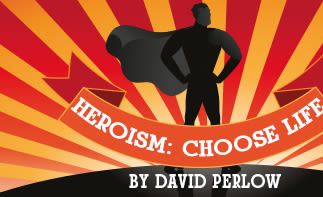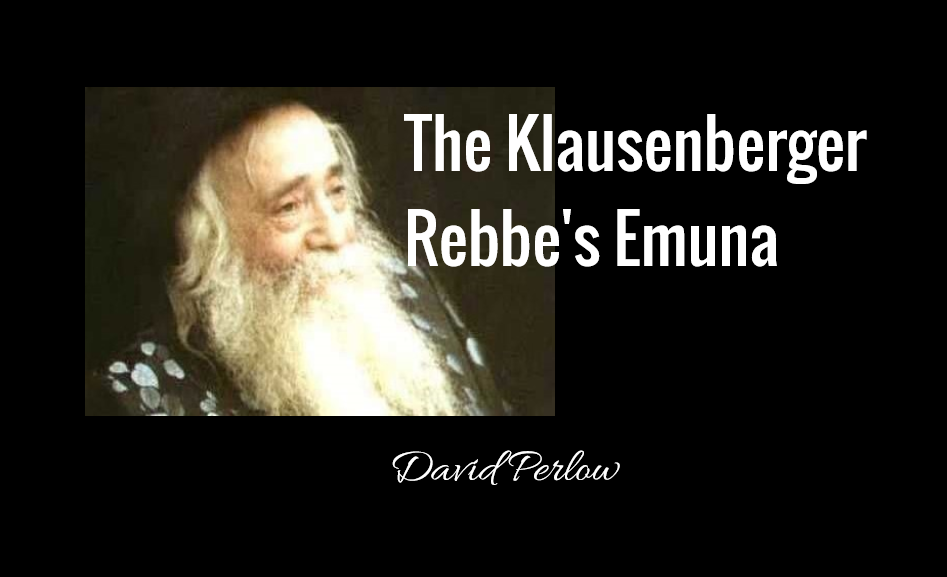
Dance the Troubles Away
Does Hashem want fasting and sackcloth? The Klausenberger Rebbe, who lost a wife and 11 children in the Holocaust, gives us proper perspective...

“A Jew can take any trouble that might befall him and nullify it immediately, if he’ll truly fulfill what our sages said (Berachot 54), ‘A person must make a blessing on the bad in the same way that he makes a blessing on the good.’ He should do this with the clear awareness that everything is from Hashem; ‘Is it not from the mouth of the Most High that evil and good emanate?’ (Lamentations 3:37). Everything is from Hashem, and I thank Him and praise Him for His great favor in remembering me and not forgetting me.”
Here’s a $64,000 quiz question: Who said the above quote?
a) Rebbe Nachman of Breslev
b) Rebbe Natan of Breslev
c) The Klausenberger Rebbe
d) Rabbi Yisroel Ber Odesser
If you answered “c”, you’re right!
The Klausenberger Rebbe, Rabbi Yekutiel Yehuda Halberstam of saintly and blessed memory. If someone were to ask me who my hero of all times was, it would have to be the Klausenberger Rebbe. In the holocaust,  he lived through hardships that no words can describe, including forced labor camps, death marches and concentration camps. He lost his beloved wife and eleven children in Auschwitz. Yet, his emuna never flinched. He never compromised his Torah observance in the slightest, miraculously remaining alive despite constant thirst and hunger. He was a beacon of strength and encouragement to the other Jewish prisoners. He lived through the holocaust to make Aliya, remarry and give birth to seven children, including Rabbi Tzvi Elimelech Halberstam shlit’a, the current Sanzer Rebbe of Netanya, and Rabbi Shmuel Dovid Halberstam shlit’a, the Klausenberger-Sanz Rebbe of New York. He founded Kiriat Sanz in Natanya, Laniado Hospital, the Klausenberger Yeshiva and Mifal Hashas, the world’s biggest “Talmud Factory”.
he lived through hardships that no words can describe, including forced labor camps, death marches and concentration camps. He lost his beloved wife and eleven children in Auschwitz. Yet, his emuna never flinched. He never compromised his Torah observance in the slightest, miraculously remaining alive despite constant thirst and hunger. He was a beacon of strength and encouragement to the other Jewish prisoners. He lived through the holocaust to make Aliya, remarry and give birth to seven children, including Rabbi Tzvi Elimelech Halberstam shlit’a, the current Sanzer Rebbe of Netanya, and Rabbi Shmuel Dovid Halberstam shlit’a, the Klausenberger-Sanz Rebbe of New York. He founded Kiriat Sanz in Natanya, Laniado Hospital, the Klausenberger Yeshiva and Mifal Hashas, the world’s biggest “Talmud Factory”.
Where did the Rebbe get his phenomenal power of resilience from?
The Klausenberger Rebbe revealed his secrets while fulfilling the mitzva of drinking wine on Purim of 1968[1]. Fulfilling the mitzva in the way of his holy forefathers by drinking an excess of wine mixed with whiskey, the Rebbe testified, “Even if they kill me, I’ll still yearn for Hashem. Even if I get burnt to a coals and ash, I won’t budge from my emuna in Hashem. Even when I was in Auschwitz, I’d say “Shema Yisrael” [out loud]. There is no possibility of budging my emuna in Hashem, for I always see His Holy Name in front of my eyes.” Who is capable of making such a statement? Everything the Rebbe said was tested and proven under fire…
The Klausenberger Rebbe addressed the challenges of our people and taught how to regard them from the proper perspective: “A father’s mercy is upon his son; it’s therefore clear that our Father in Heaven doesn’t want to harm us, for His love of His people Israel and even the sinners of Israel is well known.”
With the above in mind, our troubles here in Israel with our neighbors look completely different. The heroic Klausenberger Rebbe would tell himself in the darkest hours of the holocaust, “Since I am also from the seed of Israel, it’s unthinkable that Hashem would desire something that’s not beneficial for me. Alas, He is loving and He does only good, so even this is for the good.”
Where did the Klausenberger learn this amazing level of emuna from? He would always quote Rebbe Elimelech of Lizensk obs”m, who would say in his tremendous humility: “I’m not afraid of purgatory, so when I arrive at the Heavenly Court and they sentence me to Gehennom (purgatory), I’ll ask the archangels if it’s their decision or Hashem’s decree. If they answer me that it’s Hashem’s decree, then with greatest joy, I’ll jump into Gehennom while singing and dancing, for if Hashem sends me to Gehennom, it’s surely for the best. Not only that, but I’ll look forward to doing His will.”
The Klausenberger Rebbe fulfilled the above attitude to the letter all during the Holocaust.
The Rebbe says that weak emuna, crying and complaining that life is difficult, and failing to recognize that everything is from Hashem and for our ultimate benefit is the root of all our troubles!He adds, “When a Jew internalizes to the depths of his heart in unequivocal truth, knows and believes that everything Hashem decrees and brings upon him are for the very best, then no evil can befall him, and as soon as he thinks this, all harsh decrees are rendered null and void. With this attitude, one can nullify the decree of exile and Diaspora. This is the truth of Torah.”
The holy Klausenberger concludes and says, “In the merit of the People of Israel’s emuna and clinging to emuna, Hashem will help them and mitigate all the stern judgments against Israel, and all harsh decrees will be shattered! ‘You have transformed my lament into dancing for me’ (Psalm 30:12), we should dance instead of cry and mourn, ‘You undid my sackcloth and girded me with gladness’, joy is much more effective than fasts and sackcloth.”
May we internalize this truth of Torah and merit every miracle including the full redemption of our people, immediately, amen!







9/17/2015
still waiting for a response eom
9/17/2015
7/28/2014
Mishnayot Taanit Rebbe, if many parts of the Talmud extol thanking Hashem for our troubles, why is Mishnayot Taanit as long as it is? It should only cover Yom kippur. Why did the Rabbis envoke all these fast days for "terrible" days in history? Why are there fats fasts for other troubles like no rain and plays and war? Why isn't there a mesechta Todaah (thanking) instead; instructing us to dance and sing whenever something "seemingly bad" is happening?